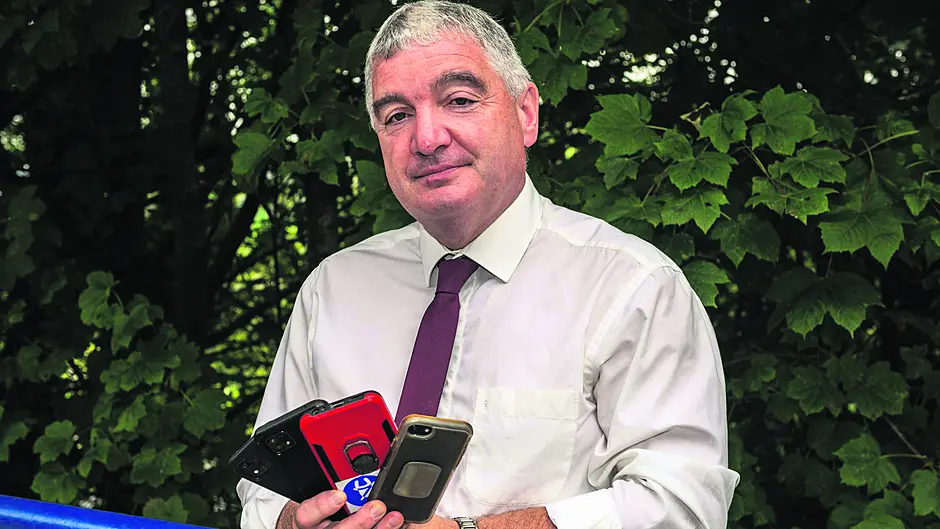With a new term kicking in, Brian Moore finds out what local schools are doing about the increasing concerns for the mental health of our teens, due to internet usage
AS a new school year dawns for thousands of children across West Cork, a new initiative to remove smartphones from primary and the junior cycle in secondary schools is under discussion.
Following a ban on smartphones by primary schools in Greystones, Co Wicklow, Senator Tim Lombard (FG) would like to see this initiative adopted by schools across West Cork.
This proposed ‘no smart device voluntary code’ initiative promotes the co-operation and collaboration of parents, guardians, and school principals to collectively agree to postpone the purchase of smart devices for their children until they go to secondary school.
‘Children, especially younger children, are facing serious peer pressure these day when it comes to owning their first smartphone,’ Sen Lombard told The Southern Star.
‘I would like to see a collective decision, especially with the primary schools across West Cork, to work together to ban smartphones and for parents to ensure that if their child has a smartphone that they know how to protect them from inappropriate apps and websites.’
Indeed, a recent Unesco report concludes that banning the use of smartphones in schools has resulted in improved academic performance, particularly for low-performing students.
‘As parents of young children, we have a lot of concerns about their well-being and safety online, and when they should be allowed to use smart devices,’ Senator Lombard said.
‘I have heard stories of children feeling excluded, being bullied, and experiencing low self-esteem when they are constantly being faced with updates on what all their peers are doing, and who they are socialising with.
‘Then there’s the potential exposure to harmful or inappropriate content, which brings a whole other set of problems.’
In West Cork, primary school principals have reported that children as young as eight years old have been given smartphones.
The schools have also reported an increase in the numbers of children being bullied online and young children being exposed to inappropriate, or highly sexual, material.
While there is already a no-mobile-phone policy at St Patrick’s National School in Skibbereen, principal Alan Foley would welcome a roll-out of the no smart device voluntary code in other schools across West Cork.
‘Peer pressure is extremely high these days for children and we have seen kids receiving smartphones and other devices as a First Communion gift,’ Mr Foley said.
‘While I know many in fifth and sixth class have smartphones, the phones are not allowed in the school and this is working well for us.
‘But it is very important that parents are aware of the problems a smartphone or other smart device can cause,’ he added.
A recent survey, conducted by website Studyclix, among first year to sixth year students, found 83% of respondents were worried that they use their smartphones too much, while 54% said apps such as TikTok and Instagram had seriously impacted their concentration or ability to study. Some other studies have also revealed that teenagers can spend an average 3.4 hours a day online, while further research showed that 45% of teenagers have witnessed some form of mistreatment online, with 1 in 10 children having experienced cyberbullying.
In 2022, Pobailscoil Chorca Dhuibhne in Dingle became the first secondary school in Ireland to introduce a system designed to limit students’ access to their mobile phones during school hours.
As students enter the school building they are immediately required to place their phones in specialised pouches which are then secured by magnetic lock.
The phone can only be released from the pouch by returning to a device outside the building and holding the pouch against it to deactivate the lock. The new school year at Mount St Michael secondary school in Rosscarbery opened with a new policy concerning smartphones for all incoming first year students.
‘When we had our open day for first years, we met with all their parents and guardians to discuss our new policy which does not allow first year students to have mobile phones or smartphones,’ principal Bart Kerrisk told The Southern Star.
‘This was a very positive meeting, with a positive reaction from the parents and guardians to the new policy, and as of this school year, no first year has a mobile phone in school.’
Mr Kerrick said it is vitally important that a discussion takes place between parents and children concerning the uses of smart devices.
At the European Parliament, MEP Deirdre Clune has welcomed new EU rules designed to curb potentially harmful practices carried out through online service providers and large social media platforms such as Amazon, TikTok, and Facebook.
‘The EU Digital Services Act (DSA) is now in force, compelling large internet service providers and social media companies to open up their systems to EU scrutiny and prove that they’re taking significant steps to ensure they are protecting users online,’ Ms Clune said.
SETTING GROUND RULES FROM DAY ONE
When planning ahead of getting your child their first phone, you should:
Set rules for phone usage before your child takes possession of their new phone. These include agreed apps, times of usage, and where it can be used. If you wait even a day later, the horse will have bolted! Early rules will ensure less arguments as the child progresses, though rules can be revised as the child reaches different age milestones.
Talk to your child often about their mobile use and safety and make sure they understand your concerns are about their safety, not about breaching their privacy.
Apply rules on where, when, and how mobile phones can be used (for example, not at mealtimes, not at school during lesson times, not after a certain time at night).
Have a central location in your home where all youngsters must leave their phones in the evening, like a hall table, or kitchen counter, for visibility, at a specified time, like 7pm or 8pm. Just be sure to check there are no ‘dummy’ phones handed up – and that the sim card hasn’t been transferred to a second phone!
Have a discussion about apps and whether your child can download them. Not all apps are suitable for children but you might need to educate yourself independently of your child before having that conversation. Ask them first about their favourite apps, then go do your homework!
Ensure that they do not respond to SMS spam, open links, or take calls from unknown numbers. But explain why.
Emphasise the importance of not letting other people use their mobile phone and to think carefully about what they share or upload. Once shared, messages and images cannot be taken back, and will potentially exist in cyberspace forever. Tell them if they wouldn’t like to see their posts or even text messages on a billboard outside their house, then don’t post them online, because the web is the internet equivalent of a public billboard.
Review the ground rules regularly as your child’s needs and expectations regarding mobile phone use will change and evolve as they grow older. Keep all devices out of the bedroom for as long as possible, as a lot of bullying behaviour happens after dark, when children may be more vulnerable, and bullies will hone in on that fact.
Keep dialogue open – make sure your child is not afraid to tell you about having made a mistake online, or the bad behaviour of others. Explain that your primary concern is the safety of them, and their friends, and that all information proferred will be treated respectfully.
CONCERNING TRENDS EMERGE IN IRISH SURVEY
THE recent report from charity CyberSafeKids showed that over 25% of primary school children (aged 8 to 12) have experienced cyberbullying during the last school year.
The incidence of cyberbullying significantly increases at secondary school (aged 12 to 16) to 40%, with girls more likely than boys to have been victimised online (43% vs 30%).
A huge 93% of 8-12 year-olds have their own smart device, with YouTube (76%) the most popular app, followed by WhatsApp (39%), Tik Tok (37%) and Snapchat (37%).
Other stand-outs in the report included:
• Online gaming – 15% of children are playing over-18 games like Call of Duty and Grand Theft Auto, which contain violent and sexually explicit content.
• Almost three-quarters (73%) of 12-16 year-olds said they can go online whenever they want.
• 31% of 8-12 year olds are allowed online whenever they want.
• 42% of young boys and 27% of girls have gamed with a stranger online.
• Young children are also unaware of how best to protect themselves online with 22% posting videos, and 17% unaware of how to manage privacy settings.








